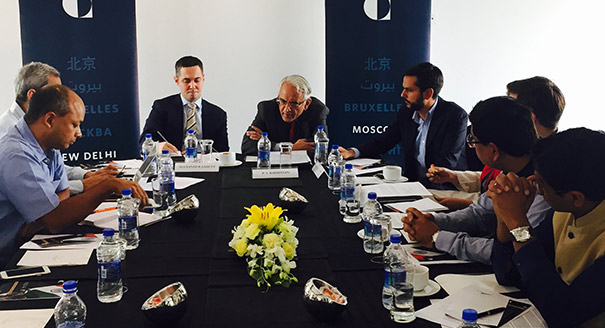Registration
You will receive an email confirming your registration.
Embattled by U.S. and European Union sanctions over wars in Ukraine and Syria, Russia is actively pivoting to the East. By reaching out to Asian powers, especially China, Moscow is trying to replace the West as a source of capital and investment, as well as a major market for Russian exports. Carnegie India hosted a private roundtable with Alexander Gabuev, senior associate and chair of the Russia in the Asia-Pacific Program at the Carnegie Moscow Center, to explore the risks and opportunities that Russia’s pivot to Asia poses for India. It was chaired by Ambassador P.S. Raghavan, convenor of the Indian National Security Advisory Board and a former ambassador to Russia.
DISCUSSION HIGHLIGHTS
- A Change in Policy: Participants argued that Russian foreign policy has altered since the annexation of Crimea. Amongst Russian elites, there are genuine feelings of hostility towards the West, which is perceived to be opposed to Russia’s independent foreign policy in a multipolar world, and its well deserved role in the international area.
- An Inconsistent Policy Toward Asia: After the Ukrainian crisis, Russian foreign policy is increasingly ad hoc and opportunistic, participants said. Given the uncertainty surrounding Brexit and the Trans-Pacific Partnership, and the way that rapidly evolving technology can render policy irrelevant within a few months, the Kremlin’s strategy is fluid and ad hoc tactics are easier to apply. Consequentially, some participants asserted, Russia lacks a coherent overarching strategy and its policies in Asia have been inconsistent. Other participants took exception to this assessment, underlining that Russia has been acting in self-defense, protecting its natural zone of strategic influence and cultivating China, India, and other powers to stem off Western pressure.
- Russia and China: An important consequence of the crisis in Ukraine is that Russia has had to reconfigure its relationship with Beijing. Participants discussed how Moscow has compensated for losses due to Western sanctions by reconsidering its position on selling advanced weapon systems and technologies to China, and its reluctance to consent to Chinese infrastructural projects within its sphere of influence. Participants agreed that the announcement of a $400 billion gas deal in May 2014 underlined Russia’s growing engagement with China. Further, participants recognized that ensuring peace is crucial for stability in the region, given that Russia and China share extensive physical borders.
- China in Central Asia: Participants explained that Moscow regards China’s increasing involvement in resource-rich Central Asia with suspicion. The region is considered to be within Russia’s sphere of influence, which should be dominated by policy that furthers Russian interests. This strategic competition is only enhanced by China’s One-Belt-One-Road (OBOR) initiative, which traverses the region challenging Russia’s own project, the Eurasian Economic Union (EEU). Linking the two initiatives will have significant security and strategic consequences, participants added. By working together to coordinate the development of the EEU and OBOR, Moscow and Beijing will seek to create an economic space in Eurasia. Participants agreed that this strategy would allow Russia to maintain its influence in the region while accommodating China’s requirement for resources. Given China’s economic clout, participants felt that China would propel economic growth in the region, while Russia would focus on the security sector.
- Security Cooperation: Participants noted that Russia’s status as an independent actor was questionable given the growing proximity between Moscow and Beijing. They looked in particular at Sino-Russian military exercises in the South China Sea, especially in light of President Putin’s support for China’s rejection of an arbitration court’s decision in the South China Sea. One participant underlined that this exercise was primarily symbolic and India should not be wary. Participants emphasized that it was conducted far from areas of conflict and should be viewed as a gesture of friendship given that China had previously participated in a naval exercise with Russia in the Black Sea, a zone of military tension with NATO.
- Increased Military Cooperation: Participants also discussed the increasing military cooperation between the two nations. Russia has been willing to sell sophisticated weapons and missile defense systems to China, which could impact the military balance in the region. Further, it was emphasized that if tensions escalate, Russia may eventually have to choose between the large arms market in China and the smaller market in ASEAN states..
- Cultural Barriers: Participants explained that Russia is considered to be a European power culturally, temperamentally, and in its principal theater of action. Despite its shift towards Asia, cultural differences remain barriers to truly deepening ties with China, because the Russian elite are still deeply oriented towards Europe and the West rather than Asia. Participants noted that Russia’s geographic and cultural proximity to Europe helps maintain a strong bond. This is compounded by a generational gap in Russian expertise about Asia, and China in particular, after the end of the Soviet Union.
- Pakistan: Indian participants questioned Russia’s rationale in conducting its first-ever joint military exercise with Pakistan. Participants discussed whether the military drill with Pakistan was worth the opportunity cost and loss of goodwill from India. They said that Pakistan distancing itself from the American orbit was perceived as an opportunity for Russia and that the two-week drill taking place in mountainous areas, named ‘Friendship 2016,’ was harmless as it was not in the Pakistan-occupied-Kashmir region. Opinions were divided between those criticizing Moscow’s move as a short-sighted and tactical initiative that will harm relations with New Delhi, and those underlining its strategic benefits to balance the United States.
This event summary was prepared by Arushi Kumar, a research assistant at Carnegie India.
